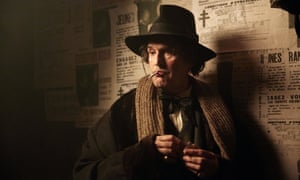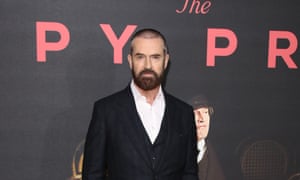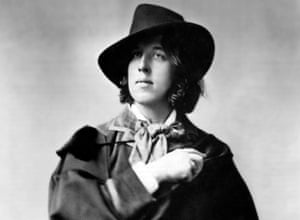
The importance of being Oscar: how Rupert Everett found a cause
T
he surprised delight that met Rupert Everett’s second volume of memoir, Vanished Years, six years ago was a hint of what might be to come. The calibre of the writing matched any living diarist, according to a broad cross-section of reviewers, from Julie Burchill in the Guardian to the Telegraph’s Robert Douglas-Fairhurst, who awarded five stars and revelled in the way the author “repeatedly slips the gears of genre, moving between scenes of farce, elegy and melodrama”. He predicted more “seriously good books” ahead, if only Everett would take himself “seriously enough”.
Well, now we know exactly what Rupert wrote next – a screenplay. And his new film biography of Oscar Wilde, The Happy Prince, has wowed film criticsin much the same way. To add to his triumph, Everett also produces, stars and directs, appearing alongside Colin Firth and Julian Wadham, two of his oldest theatrical buddies. “I loved working with me as an actor,” Everett quipped to red carpet reporters at the film’s London premiere last Tuesday.
Yet the real love affair here is not between Everett and himself, as he regularly teases. The truly enduring relationship is with Wilde, whose plays Everett has now appeared in on stage and whom he has played in productions, and whose tragic personal story the actor has struggled for years to bring to the screen.
The Happy Prince shares its title with Wilde’s melancholic children’s classic and is a sensitive, passionate tribute to a fallen literary idol. It covers the period after Wilde’s imprisonment in Reading, once he was forced to flee England. Living in near penury in the south of France in his mid-40s, he looks back at his great successes and squalid defeats at the hands of the establishment.
The great Irish writer’s descendant, Merlin Holland, often called upon to judge fresh interpretations of his grandfather’s life, has already pronounced Everett’s incarnation to be the best so far. He was “terribly moved”, he told the Guardian last week, adding, “In Oscar, there’s both the intellectual and the emotional. But, at this stage of his life, he’s living on what’s left of his emotions, and that’s where Rupert wins.”
Everett first played Wilde in the Hampstead Theatre’s revival of David Hare’s play The Judas Kiss in 2012, succeeding in a role inhabited less comfortably by Liam Neeson in the original 1998 production. He went on to become the toast of the West End and then New York. The Hollywood Reporter thought Everett’s performance “deserves to become legendary”.
When The Judas Kiss opened, Everett spoke candidly of his feeling for Wilde: “For me, he’s a patron saint figure, or even a Christ figure, because in one sense he was crucified and then came back to life and, for the gay movement, he was the beginning.” Later, Everett, who came out as gay in 1989, spoke of his joy at playing the part on the night gay marriage became legal in Britain.
This link to Wilde and a commitment to fight homophobia have fuelled Everett’s determination to make The Happy Prince. His co-stars have expressed wonder at Everett’s infectious zeal for the project. Edwin Thomas, who plays Robbie Ross, found him “inspirational”, while Tom Colley, who also appeared with Everett in The Judas Kiss, said: “I don’t know how he has [had] the energy through the whole process.”
Talking to the press after the premiere, Everett downplayed his achievement, saying: “I just did it. I got on with it”, but more lyrically added that the story of this “fallen star speaks for me as well, in some strange way”.
Certainly, the tone of pained nostalgia in The Happy Princeresembles passages in Vanished Years, particularly a description of lost sun-kissed months spent in the south of France, although the poignant title of Everett’s memoir actually comes from a poem by Noël Coward:
When I have fears, as Keats had fears,
Of the moment I’ll cease to be,
I console myself with vanished years…”
The book followed a 2006 memoir with the less romantic title, Red Carpets and Other Banana Skins. It was also well-received and chronicled his success at the age of 21 in the hit play Another Country.
A Catholic boarding-school boy, he had run off to train as an actor, funding his fees with work as a rent boy. His early film roles peaked with Dance with a Stranger, about the Ruth Ellis case, and film industry interest was renewed in 1997, when he starred with Julia Roberts in My Best Friend’s Wedding, but faltered after his appearance opposite Madonna in the failed comedy The Next Best Thing. Treading water, Everett voiced Prince Charming in two of the Shrek movies and turned up in two St Trinian’s films, before emerging recently with highly rated cameos on TV, including in Parade’s End and the comedy Quacks.
His old friend Wadham remains in awe: “I have known him since he was 14 years old, when he played piano to grade 8, sang in the choir and acted. He excels at everything and has tremendous fidelity to his artistic vision and to friendship,” he said last week.
Wilde and Everett also share a dangerous habit of saying what should not be said. Six years ago, when Everett naughtily cast some doubt on whether a modern child would enjoy being brought up by two gay dads, he was villified in the press. In his time, Wilde expressed equally unpalatable views about family when he wrote darkly that “children begin by loving their parents; after a time they judge them; rarely, if ever, do they forgive them,” though his words were recognised as a witty inversion of bland domestic cant.
As a gay man who lived through the ravages of Aids in the 1980s, Everett might feel he has the right to speak. “People have forgotten about all that. It was absolute terror,” he said recently.
Everett’s friends clearly feel he has earned his spurs as both a survivor and a campaigner. The soul of the new film, Wadham believes, is a moment in which Wilde unexpectedly rounds on a gang of bigots in Paris, shouting: “The natural habitat of the hypocrite is England! Go there and leave me in peace!”
“This venom reflects the anger Rupert himself rightly feels for people who have that kind of prejudice and cruelty.”




No comments:
Post a Comment